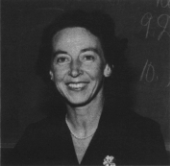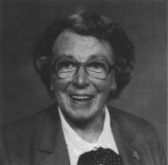




Mary Bristow, a South County native, is a quiet, retired English teacher who helped out in the war effort and kept in contact with her many students who went away to war. A resident of West Kingston, she still lives in the house where she was raised.
I began teaching English in 1936 and loved it. Once the war started, many of my students were drafted, or as soon as they graduated they had to sign up for the war. I really felt bad when the students were drafted. they were so young, only eighteen years old, with so little preparation. They were leaving, maybe never to return.
Those who did leave sent many letters to me. Oh, I had hundreds and hundreds of letters. I can remember one particular letter that still sticks in my mind. A boy named Charlie was in the Navy, at boot camp in northern New York, I have forgotten just where. It was the most impressive sight that he had ever seen -- just hundreds and hundreds of boys all in white uniforms, all lined up to receive communion. He described the whole scene in great detail. It was a lovely letter. I saved it for years.
Another boy was stationed down around New Orleans and he wrote me weekly letters. None of the letters were censored. They never ever told secrets. They were very careful. They were very nice letters. They were not written as though they were written to an English teacher; they were written to a friend.
What other work did you do for the war?
I was also a air raid warden instructor. I went to Providence, to the armory on North Main Street, and there we were trained. We then came back and conducted schools where we taught air raid wardens procedures of how to act in case of an air raid, how we were to keep people in shelters during the air raids, and what to do with casualties. I didn't particularly enjoy being an air raid warden instructor, but I was glad to help. I was glad to do it. I was doing my patriotic duty.
During the war we had food rationing , and I was on the board for sugar rationing. That was a very special project. I was the local chairman for Kingston and South Kingstown. Sometimes I was very angry because some people came in and filled out applications for more sugar than they were entitled to. They said they were going to can peaches and pears, and I know that they were not going to do that, but most people were very cooperative. The sugar rationing went very well.
Another thing we did was to can fruits for the hospital. Groups of women throughout South Kingstown gathered at the Neighborhood Guild and we canned. We worked for days and days and days canning peaches for the hospital and then they served them to the patients. But this was a community action.
At school we had drives collecting metal, and people brought in pots and pans right out of their kitchens. Oh, my, what a mess! But, we did it. In school we sold war bonds, and we had competitions in school to see which homeroom would sell the most. This was another sign of patriotism.
I was glad when the war ended and the boys could come back and finish their education. We had one big class of returned veterans, and one particular teacher had all the veterans in her homeroom and she just loved them. They were more mature. They had had such experiences, you just can't imagine. I know three of the boys were having difficulty with English, so I used to tutor them during a free period to help them. Somtimes they couldn't even talk about their experiences; they were just so deep that it would have torn their hearts right out to relay the stories.
Copyright 1995